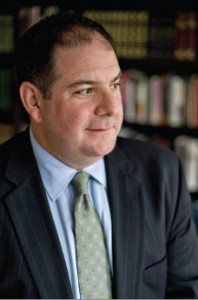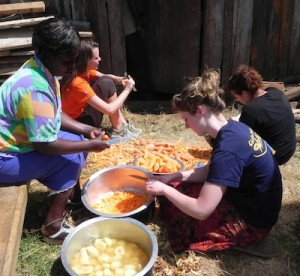 [dropcap3]A[/dropcap3]bout twelve years ago, I gave a series of talks in chapel here at PBU on the words sacrifice, excellence, integrity, and discipline. I remarked to the students at that time that I thought the word sacrifice was not a very popular term, that it was not a quality that was highly valued in the broader popular culture, and yet was necessary, helpful, and most importantly, biblical. I believe I have given some version of that series of talks every year since, and I am more convinced than ever that the world is in desperate need of men and women who understand the need for sacrificial living and who possess the faith and character qualities that make it possible. The world is in need of those whose lives are marked by selflessness in thought, word, and deed – both in quiet, unheralded ways as well as public ones. We all know the current day in which we live is full of challenges, concerns, and uncertainties, from economic and political to personal and professional. But it is also a day of exciting opportunities to make a truly positive contribution. It is a day ripe for the enlistment of men and women to give themselves to the greater good and the greater glory of God. But sacrificial service does require selflessness and selflessness requires faith, obedience, and maturity. And it also requires practice.
[dropcap3]A[/dropcap3]bout twelve years ago, I gave a series of talks in chapel here at PBU on the words sacrifice, excellence, integrity, and discipline. I remarked to the students at that time that I thought the word sacrifice was not a very popular term, that it was not a quality that was highly valued in the broader popular culture, and yet was necessary, helpful, and most importantly, biblical. I believe I have given some version of that series of talks every year since, and I am more convinced than ever that the world is in desperate need of men and women who understand the need for sacrificial living and who possess the faith and character qualities that make it possible. The world is in need of those whose lives are marked by selflessness in thought, word, and deed – both in quiet, unheralded ways as well as public ones. We all know the current day in which we live is full of challenges, concerns, and uncertainties, from economic and political to personal and professional. But it is also a day of exciting opportunities to make a truly positive contribution. It is a day ripe for the enlistment of men and women to give themselves to the greater good and the greater glory of God. But sacrificial service does require selflessness and selflessness requires faith, obedience, and maturity. And it also requires practice.
The world is in desperate need of men and women who understand the need for sacrificial living.
When I tell people that I think we need to keep talking to undergraduate and graduate students about the importance of sacrifice, the responses I often get range from disbelief to ridicule for thinking that this is a message that would “sell” to students. It is understandable that some see the idea of sacrifice as off-putting. It is understandable that some think students are not interested in being called to give up for the sake of others or for a cause. And it is understandable that some think that making sacrifice a central idea in life is a marketing blunder because it is not what people want to hear. But while these things may be understandable, that does not make them right.
At PBU, we expect our students to learn the important lessons in life: that their lives are not their own and that they are called to something greater than their own self interests. This is biblical. In difficult times, people need to be challenged to think beyond their own circumstances, to dig down deep and find the resolve to persevere, and to envision what is possible if we set aside ourselves and our existing notions of comfort and entitlement and give of our time, talents, and resources. We expect our students to learn these things by practicing them. As students they give and sacrifice. They are not simply consumers, as the culture might expect them to be. And when they graduate, whether they are social workers or soldiers, they will be called upon to sacrifice. As parents, pastors, or teachers they will need to set aside themselves for the sake of those entrusted to their care. As business leaders, performers, or any other professional, they will need to work hard and make decisions and create opportunities that will benefit others. This is the Christian way.
 For several years I have read the first question and answer to the Heidelberg Catechism to the graduating class at commencement rehearsal. It is a poignant reminder to us of a biblical truth that should focus and embolden us as Christians. The first question reads simply: “What is your only comfort in life and death?” The answer is a powerful one: “That I, with body and soul, both in life and death, am not my own, but belong unto my faithful Savior Jesus Christ; who with His precious blood has fully satisfied for all my sins, and delivered me from all the power of the devil; and so preserves me that without the will of my heavenly Father not a hair can fall from my head; yea, that all things must be subservient to my salvation, wherefore by His Holy Spirit He also assures me of eternal life, and makes me heartily willing and ready, henceforth, to live unto Him.” I trust this edition of PBU Today will give you a real sense of the vision we have for sacrifice as a biblical university and that it will encourage you as you contemplate the needs of this day and the potential our students have to meet them.
For several years I have read the first question and answer to the Heidelberg Catechism to the graduating class at commencement rehearsal. It is a poignant reminder to us of a biblical truth that should focus and embolden us as Christians. The first question reads simply: “What is your only comfort in life and death?” The answer is a powerful one: “That I, with body and soul, both in life and death, am not my own, but belong unto my faithful Savior Jesus Christ; who with His precious blood has fully satisfied for all my sins, and delivered me from all the power of the devil; and so preserves me that without the will of my heavenly Father not a hair can fall from my head; yea, that all things must be subservient to my salvation, wherefore by His Holy Spirit He also assures me of eternal life, and makes me heartily willing and ready, henceforth, to live unto Him.” I trust this edition of PBU Today will give you a real sense of the vision we have for sacrifice as a biblical university and that it will encourage you as you contemplate the needs of this day and the potential our students have to meet them.
[framed_box]Todd J. Williams, Ph.D., has been the President of Philadelphia Biblical University since January 2008. He served as faculty and an administrator from 1996 to 2001, and then returned as Provost in 2005. Interact with Dr. Williams at PBU’s blogsite.
[/framed_box]